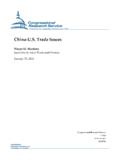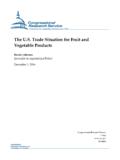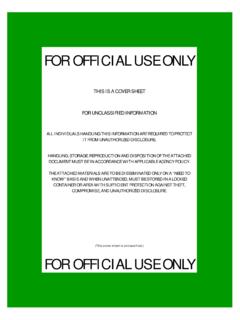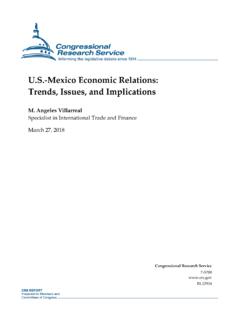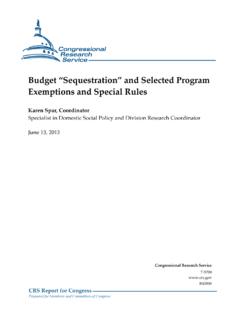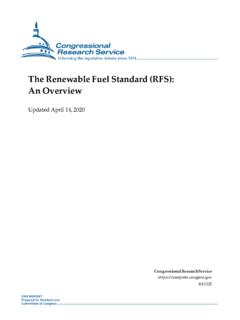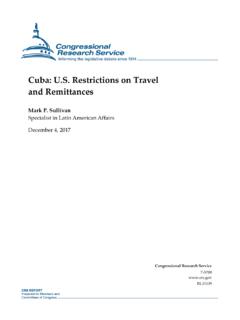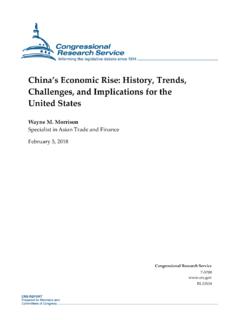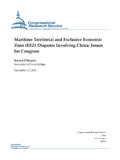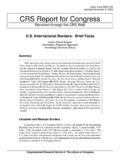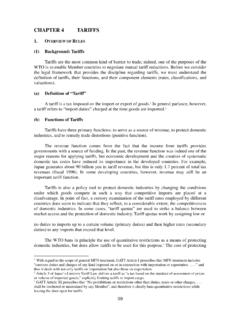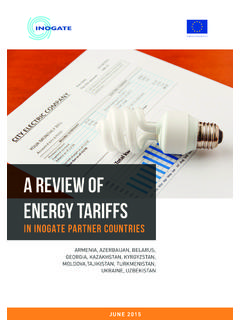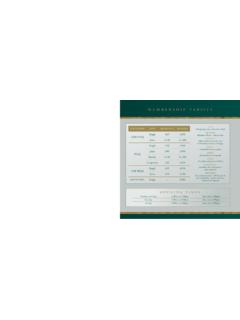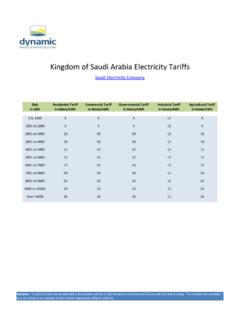Transcription of Presidential Authority over Trade: Imposing Tariffs …
1 Presidential Authority over trade : Imposing Tariffs and Duties Caitlain Devereaux Lewis Legislative Attorney December 9, 2016 Congressional Research Service 7-5700 R44707 Presidential Authority over trade : Imposing Tariffs and Duties Congressional Research Service Summary The United States Constitution gives Congress the power to impose and collect taxes, Tariffs , duties, and the like, and to regulate international commerce. While the Constitution gives the President Authority to negotiate international agreements, it assigns him no specific power over international commerce and trade . Through legislation, however, Congress may delegate some of its power to the President, such as the power to modify Tariffs under certain circumstances. Thus, because the President does not possess express constitutional Authority to modify Tariffs , he must find Authority for tariff-related action in statute. Prior to the early 1930s, Congress itself usually set tariff rates for imported products.
2 over time, however, Congress increasingly delegated Authority to the President to reduce Tariffs , subject to statutorily prescribed time periods, periodic review, and renewal. As the focus of international trade negotiations shifted from the imposition of Tariffs to other non-tariff barriers to trade , such as antidumping duties, however, Congress was less inclined to authorize the President to implement such measures by Presidential proclamation. Instead, Congress provided for legislative implementation of international trade agreements under an expedited procedure, so long as certain criteria were met. over the past few decades, Congress has continued to enact various provisions governing the negotiation and implementation of trade agreements, but has not delegated to the President a general Authority to modify tariff rates. Congress s delegations of tariff and other trade -related powers to the President through legislation have been worded in various ways.
3 A non-exhaustive list of sample statutory provisions that delegate some Authority to the President to take trade -related action shows that most provisions require that the President make some threshold finding or determination before he may take some circumscribed trade -related action to counteract his finding. More recent statutes frequently begin with the word Whenever to set out this threshold determination before delineating the specific Authority given to the President. These delegations of power are usually accompanied by clearly defined conditions and frequently include time restrictions. When the President exercises powers over trade delegated to him by Congress, his actions might be challenged in court. These challenges often involve both procedural matters and substantive issues related to the scope of the President s Authority under the Constitution and statute. As a threshold matter, a court must determine whether it has jurisdiction to review a challenge to a trade -related Presidential proclamation.
4 The jurisdictional statute of the Court of International trade has been construed to vest that court with jurisdiction over challenges to trade -related Presidential proclamations because the court has limited exclusive jurisdiction over specific matters arising under the Tariff Act of 1930 and possesses all of the equitable powers of a federal district court. As to the merits of such a challenge, a delegation of power by Congress will likely be upheld as constitutional so long as the statute asks the President to carry out the will of Congress as expressed in its statute, rather than to play a law-making role. Once a court determines it has jurisdiction to review a case and that a delegation of power by Congress was constitutional, it will likely turn to whether the President acted within the scope of his delegated powers as defined by the words of the statute. While a court will probably not review the reasoning behind a President s determination that executive action is warranted, it will likely examine closely whether the selected means of executing the delegated powers bear a reasonable relationship to that determination.
5 Presidential Authority over trade : Imposing Tariffs and Duties Congressional Research Service Contents Introduction .. 1 Constitutional Framework .. 1 Delegation of Tariff Powers to the President .. 2 Sample Provisions Delegating Tariff Powers to the President .. 3 Challenges to the Exercise of the President s Authority .. 7 Contacts Author Contact Information .. 14 Presidential Authority over trade : Imposing Tariffs and Duties Congressional Research Service 1 Introduction The 2016 Presidential election drew much attention to the country s trade policies1 as candidates advanced trade proposals intended to improve the economy and the terms of certain trade These proposals raise questions about the President s Authority to act unilaterally in this area, especially his ability to impose Tariffs on imported goods from certain countries, and continue to prompt debate While Tariffs fell out of favor in international trade negotiations by the 1970s,4 the 2016 election cycle brought renewed consideration of the use of Tariffs as a means to aid businesses.
6 An understanding of the constitutional and statutory underpinnings of the tariff-making power, a cognizance of the role of Tariffs in trade law over time, and an examination of the evolution of related trade legislation are necessary to evaluate any future executive actions with regard to trade policy. In this vein, this report describes the constitutional framework establishing Congress s tariff powers, as well as the President s Authority to act pursuant to specific legislation from Congress. It then provides examples of statutory provisions that delegate tariff powers to the President. Finally, it concludes with an overview of how the President s exercise of his delegated tariff powers may be challenged in the courts. Constitutional Framework Article I of the Constitution gives Congress the Power To lay and collect Taxes, Duties, Imposts and Excises, to pay the Debts and provide for the common Defence and general Welfare of the United States, 5 and To regulate Commerce with foreign Nations, and among the several States, and with the Indian Tribes.
7 6 Thus, Congress is constitutionally authorized to raise revenue through taxes, Tariffs , duties, and the like, and to regulate international As with all of 1 See Gene E. Godley, Paul Nathanson & Joshua C. Zive, International trade Policy: Post-Election Update 2016, NAT L L. REV., November 15, 2016, ( The 2016 elections featured the most focus on international trade policy since 1992. President-elect Donald Trump placed harsh criticisms of the North American Free trade Agreement (NAFTA), the Trans-Pacific Partnership (TPP) and China and made international trade the center of his economic agenda. ). 2 See, , Scott Calvert & John W. Miller, Trump Repeats Threat to Seek 35% Import Tariff for Companies Moving Jobs Overseas, WASH. POST (December 4, 2016, 11:20 AM), ; Mahita Gajanan, Donald Trump Warns of 35% Tariff for Companies That Move Abroad, FORTUNE (December 4, 2016, 11:11 AM ), ; Maggie Haberman, Donald Trump Says He Favors Big Tariffs on Chinese Exports, TIMES: FIRSTDRAFT (January 7, 2016, 11:21 AM), ( Donald J.)
8 Trump said he would favor a 45 percent tariff on Chinese exports to the United ). 3 See, , Roger Yu, Trump s Tariff Tweets. What Can He Really Do?, USA TODAY (December 6, 2016, 6:48 PM), ; Sara Hsu, How Far Can Trump Go on Chinese trade Policy?, FORBES (November 14, 2016, 9:40 AM), #2d2bdc232815. 4 See Int l trade Comm n, trade Policy Since 1934, in Pub. 4094, THE ECONOMIC EFFECTS OF SIGNIFICANT IMPORT RESTRAINTS 60 61, 70 75 (2009); see also CRS Report RL33743, trade Promotion Authority (TPA) and the Role of Congress in trade Policy, by Ian F. Fergusson. 5 CONST. art. I, 8, cl. 1. 6 CONST. art. I, 8, cl. 3. 7 See United States v. Yoshida Int l, Inc., 526 560, 571 ( 1975) ( The people of the new United States, in adopting the Constitution, granted the power to lay and collect duties and to regulate commerce to the Congress, not to the Executive. (quoting CONST. art. I, 8, cls.)
9 1, 3)). Presidential Authority over trade : Imposing Tariffs and Duties Congressional Research Service 2 its express constitutional powers, Congress has the accompanying Authority to make all Laws which shall be necessary and proper for carrying into Execution these Under Article II of the Constitution, the President has the Power, by and with the Advice and Consent of the Senate, to make Treaties, provided two thirds of the Senators present concur. 9 The Constitution, however, assigns no specific power over international commerce and trade to the In other words, under the Constitution, the President has the Authority to negotiate international trade agreements,11 but Congress has sole Authority over the regulation of foreign commerce and the imposition of Tariffs . Thus, because the President does not possess express constitutional Authority to modify Tariffs , he must find Authority for tariff-related action in statute.
10 Delegation of Tariff Powers to the President Prior to the early 1930s, Congress itself usually set tariff rates for imported In 1934, Congress for the first time expressly delegated to the President the Authority to reduce Tariffs in the Reciprocal Tariff This Authority , however, was limited by statutorily prescribed time periods within which the President could exercise such power, and was subject to periodic review and From 1934 until 1974, Congress continued to enact legislation delegating some Authority to the President to negotiate tariff rates with other countries within pre-approved levels, and to implement agreed-upon tariff rates through proclamation, rather than through congressional As the focus of international trade negotiations shifted from the imposition of Tariffs to other non-tariff barriers to trade , such as antidumping duties, Congress was less inclined to authorize the President to implement these non-tariff measures by Presidential Instead, in the trade Act of 1974, Congress provided for legislative implementation of international trade agreements under an expedited legislative procedure, now known as trade 8 CONST.
